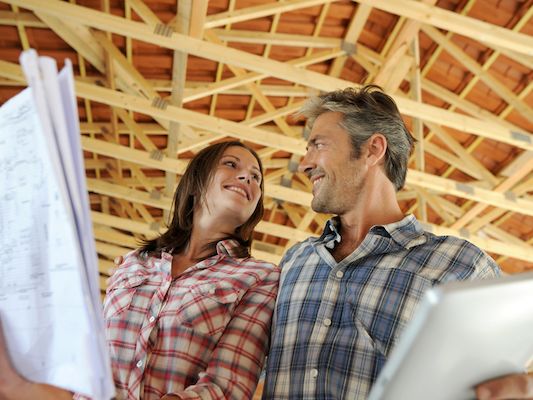4 Reasons to Consider Eco-Friendly Building Materials for Your New Home

11/05/2019
According to the Environmental Protection Agency (EPA), Americans spend 90 percent of their time indoors in an environment full of pollutants. Unfortunately, common building materials, central heating and cooling systems, and everyday appliances can be sources of pollutants and toxins within the home, which is why choosing eco-friendly materials is so important.
For homeowners looking to build a healthy indoor environment while creating minimal impact to the outdoor environment, the popularity of eco-friendly building materials (sometimes referred to as “green”) should come as no surprise. In fact, global green building continues to double every three years.
Broadly defined, eco-friendly products are those that do not harm the environment. When used in construction, eco-friendly building materials offer numerous benefits to homeowners that conventional building materials may not. Want to know more about the benefits of eco-friendly building materials? Read below to learn more.
What are Eco-Friendly Building Materials?
Compared to conventionally manufactured products or materials, eco-friendly products are designed to enhance one’s living space while respecting the natural environment. In order to be considered eco-friendly, a product will usually meet several of the following criteria:
- Come from renewable resources
- Reduce air, land, or water pollution
- Demonstrate extensive durability or life span
- Made from recycled materials
- Contribute to energy efficiency
Common Eco-Friendly Building Materials
Green building materials are abundant thanks to growing demand for green and sustainable construction. There are many different options to enhance your living environment, so here are a few common eco-friendly options to consider.
Earthen Materials
Earthen materials are those that naturally occur in the earth, such as minerals, clay, and soil. Earthen materials can also include metals and precious rocks. Due to their strength and durability, earthen materials like brick, stone, and sand are commonly used to build walls and manufacture insulation products.
Bamboo
Bamboo is a fast-growing regenerative grass species that has been used in construction for centuries. Bamboo does not require irrigation, pesticides, or chemical treatments to grow, making it an abundant sustainable resource. Its flexibility and strong natural fibers make it a good material for flooring and walls. Depending on the species and color, it can be more durable than hardwood.
Fiberglass
Fiberglass is known for its insulation purposes and is also a great sustainable option. Many insulation products are being produced without harmful chemicals like phenol/formaldehyde (PF), and with recycled glass bottles and sand. Fiberglass is a cost-effective, recycled insulation material that’s a perfect solution for thermal and acoustical barriers, particularly for residential properties.
Why Choose Eco-Friendly Building Materials
Choosing eco-friendly building materials helps to reduce the impact on the environment, while ensuring your home is constructed with sustainability and optimum performance in mind. But the benefits of using sustainable construction materials in your build go beyond protecting the environment. Green buildings and their associated materials may enhance overall well-being and may have a positive impact on quality of life for you and your loved ones.
1. Improve Indoor Air Quality
The EPA reported that indoor air can be two to five times more polluted than the air outdoors due to naturally occurring sources and environmental factors, like plants, animals, and chemical byproducts. That’s why it’s important to make smart choices when choosing building materials for your home.
Choosing products that are non-toxic, made from recycled materials, and free from harmful chemicals ensures that fewer pollutants are cycled through the air.
2. Reduce Exposure to Toxins
Many conventional building products contain harmful toxins. Some of the most common household culprits are Polyvinyl Chloride (PVC), a material commonly used in water and sewage pipes, insulation for electrical cables, gutters, and window frames.
Another chemical commonly found in building materials is formaldehyde. Formaldehyde is often found in pressed wood products or in adhesive materials and paints. Thankfully, as consumer awareness rises, manufacturers are turning to alternative sources for building materials, like formaldehyde-free insulation.
3. Improve Well-Being
A study by the UK Green Building Council cited that 30 percent of homeowners are willing to pay more for a house that contributes to their health and well-being. These homeowners are part of the growing popularity of biophilic design. Biophilic design is the idea of bringing the natural environment indoors and has been shown to positively impact human health.
Improved mental health goes beyond just the natural look and feel of the space, but how it’s constructed as well. Buildings with fresh, clean air, decreased sound pollution, and natural light have been shown to increase productivity and overall well-being.
4. Save Money
The long-term cost savings of using eco-friendly building materials is one of the major advantages of choosing to build with them. According to the U.S. Green Building Council, green homes consume 40 percent less energy. In addition to the monthly cost savings from alternative building materials and efficient fixtures, perks such as tax rebates and insurance discounts can increase the long-term payoff.
Using eco-friendly building materials in residential construction is increasingly common and may have significant, positive impact on the health and happiness of your family. Earthen materials, bamboo, plant-based fibers, and insulation made from recycled materials are just a few products that can be used to enhance your living space.
Knauf Insulation is Your Eco-Friendly Resource
At Knauf Insulation, we believe making the world better starts with the spaces in which we live, work, and play. Our products are made from natural, more sustainable organic resources like sand and recycled glass, and we proudly feature ECOSE® Technology and bio-based products. With all the benefits of eco-friendly building materials, choosing Knauf Insulation’s eco-friendly residential insulation products for your construction project is sure to make your home a safe, enjoyable space for all.

